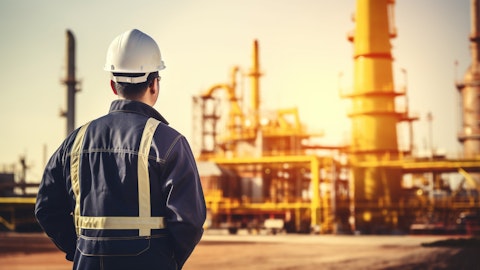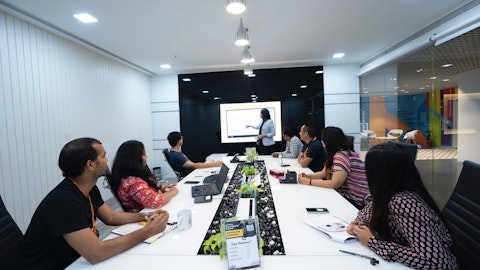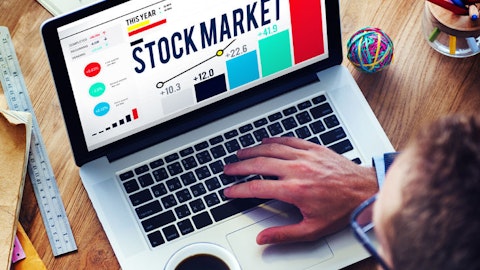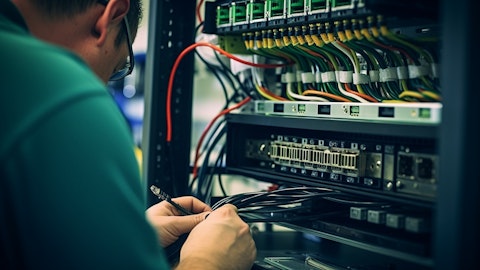There could be a lot of possible use cases. So I think it’s important to maintain Bitcoin Cash. Doesn’t involve a lot of expense. A matter of fact, we already paid for the machines. We can always switch back. So we’re going to continue doing that. Litecoin, same thing. I know you didn’t ask, but Litecoin, the same thing. And maybe in the bolus time, we’ll actually do some other coins as well. Over the years, we have mined some Ethereum, Ethereum is not mined anymore. Now it’s a proof of stake system. We mined some Ethereum classic over the years, we still have it. So there’s a lot of interesting things to be done. So I guess I hope that’s enough on that question.
Therese Byars: I suspect you will comment on the 11 new U.S. bitcoin spot ETF, given the expense differential will he transition out of GBTC and if so, into which of them?
Murray Stahl: Well, I wish I could – let’s boost but let me – I’d be very careful to have me answer the question because I can’t give you the kind of information that you’re seeking. All I can say is I am well aware of what the differential is, and there are a lot of options doing things. The only restraining factor is taxes. So we like it possible not to pay them. So in preparation, if we were to do something, which I’m not verifying, we’re doing or not doing. But if we were to do something, we would very like to much like do it on a tax-free basis. And even though we have verbal opinions. We’re not going to do anything unless we get a written opinion for an order. So we don’t have a written opinion yet, although we have a verbal opinion. So we’ll have to evaluate once we – if we get – to once we get a written opinion that we can do something on a tax-free basis, I will be able to give you a much more lengthy and detailed answer to your questions.
Therese Byars: What and how – or how many coins were mined in the recent quarter? What – another were sold, Litecoin?
Murray Stahl: I don’t have that at my fingertips. I will just tell you that we hold many more coins than we sell. So basically, in Consensus Mining, we basically haven’t been selling any coins. So why haven’t we been selling coins, it’s a generalization, because we raised a lot of capital in our private offering and we never spent the money and interest rates are now 5%. So interest income is such, when I’m using income, we basically use the interest income to pay the electric bill. So I don’t think we sell very many coins at all. In Winland, we don’t have such big cash balances. So we do sell coins, but we – I don’t have the figures in front of me, but basically net, we grow our coins every quarter. We’re not selling more coins than we mine.
The goal is to mine more coins that we sell. And every quarter, we want to grow our number of coins. It’s really, really important to grow our number of coins every quarter. And I don’t think we’ve ever gone down sequentially in the quarter in terms of number of coins in contradistinction, with a lot of other companies do. I think we’re always growing our coins and I pay very close attention to that. I wish I had the figures in front of me, but those are other publicly traded corporations and they’ll have to speak for themselves, but it’s very important that we keep increasing the number of coins we have. And if I can do it, we’re going to keep increasing the number of coins.
Therese Byars: We do list the crypto holdings on the FRMO website under Quarterly Conference Calls. So…
Murray Stahl: Yes. And people can see that we grow the coin, if you look at that, you can see we’ve grown the coins. We’re not selling coins. So you can compare linearly sequentially quarter-by-quarter. You can see what’s happening. So I’m going to look it up now just for the heck of it. And we held directly, I’m going to round 152 bitcoin, this is November 30, and we held indirectly another 24, I’m rounding down, not up. Then let’s see if I can get something, see if I can, I’ll do the quarter before. Let’s see if I can give you a number. Yes. So held directly, we had – I’m rounding down, I mean, excuse me, not 24, 149. So we increased and held indirectly 24, I round down this. I think it went up anyway when you round. So if I can look it up, No, it’s the same, 24.17.
So indirectly, we got the same. Directly, we’ve increased by 152, 49, call it, three coins in the quarter. It doesn’t look accurate to me for the simple reason that I know Consensus increased number of coins, it should have went up. So it doesn’t look accurate to me. But anyway, maybe you can check, I think…
Therese Byars: It’s as of November 30. So since then…
Murray Stahl: Well, I know, but August 31, November 30 that Consensus increased number of bitcoin. So it’s definitely bigger. So you might want to actually, beg your pardon, we did increase. It’s very small, but we have a small holding. So as of November 30, the number is, this is indirectly, it’s Consensus in Winland, 24.26, and held indirectly on August 31, 24.17, so did increase. As I said, we don’t own a lot of Consensus yet, in Winland we own a lot of it, but it’s a very small company. They only had 65 coins. So we didn’t mine that many coins for the quarter. So we didn’t grow by that much.
Therese Byars: Without revealing anything that might reduce Horizon Kinetics or FRMO’s competitiveness, would management give a bit more information about FRMO’s and associated subsidiaries, mining rig procurement process. I’m mainly asking this because the fact that FRMO is apparently being required to pay in bitcoin for this equipment by manufacturers as told in the previous shareholder meeting it is a bit surprising to me. For example, BITMAIN, one of the largest bitcoin mining rig manufacturers, those payment options on their website, including USD wire transfer and their payment terms on their support page do not refer to any such policy of only accepting bitcoin.
Murray Stahl: Okay. Well, to begin with, last couple of purchases, we did not pay in bitcoin. We paid in USD. And we didn’t buy from BITMAIN. We didn’t buy the equipment in BITMAIN. We bought the equipment from wholesalers. So why did we buy the equipment wholesalers? So a lot of the miners, the publicly traded ones, board equipment. And unfortunately, they can’t pay for it. So it’s sitting in a warehouse. So the tariff was already paid on. So some wholesalers somewhere, or some number of wholesalers own this equipment, the intended recipient cannot pay or does not intend to pay or does not wish to pay or whatever. So we’ve done that. We’ve done that in USD. So sometimes, we’ll put an order in with the wholesaler. And we combine our order with that of other companies to make a really big order, and that order really does go to BITMAIN, but the idea is to make it a really big order that all the participants in the agglomeration of the order can get the discount for volume.





